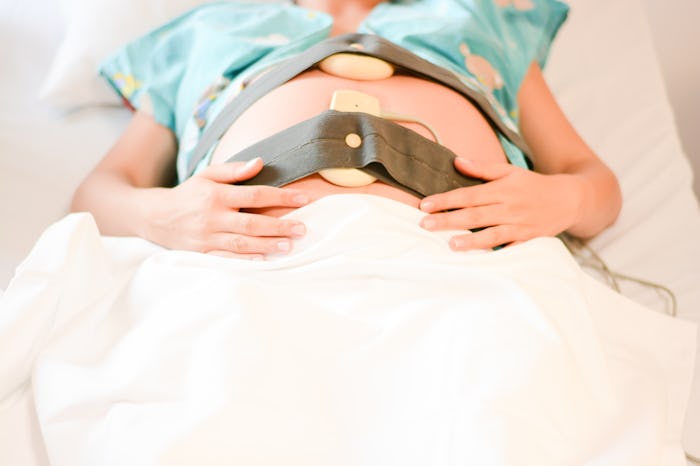Life

Here's Why You Might Feel Some Contractions Way Before It's "Go Time"
Even if you're new to this whole pregnancy thing, I think it's safe to assume you're familiar with contractions. You know, those "lovely," painful things that happen when you're in labor? The "cramps" that signify the start of childbirth? Yeah, those things. But did you know that you're likely to experience a few contractions prior to labor? Pregnancy is filled with "fun" little surprises, you guys. But what causes contractions during pregnancy? And perhaps more importantly, when should a pregnancy contraction send you to the nearest hospital, or at least warrant a call to your health care provider? Thankfully, more than a few experts have the answers that should help you remain cool, calm, and collected when your muscles decide to go rouge.
One of the biggest causes of contractions during pregnancy is simply being pregnant, according to the American Pregnancy Association (APA). Contractions that aren't part of active labor are called Braxton Hicks contractions and, according to the APA, "The term originated in 1872 when an English doctor named John Braxton Hicks described the contractions that occur before real labor." Those contractions can happen just because you're pregnant, and aren't necessarily a cause for alarm.
So, how will you know if your contractions are Braxton Hicks or active labor? The Bump explains that there are a few ways you can tell, reporting the following:
"One of the key differences between Braxton Hicks contractions vs real contractions is that they’re irregular while labor contractions are consistent. But pain levels are a factor too."
The Bump went on to explain that if you get up and move around and your contractions subside, that typically means they are Braxton Hicks. Additionally, Braxton Hicks contractions are only felt in the front, whereas "real" contractions start in the back and move to the front.
According to What To Expect, Braxton Hicks contractions can start during your second trimester, but are more likely to happen during your third trimester. They can be more common to experience during the end of the day, when your body is (understandably) tired, and they can last anywhere from 30 to 120 seconds.
Braxton Hicks contractions can also be caused by a few variables you'll probably want to pay attention to, no only to increase your comfort but to ensure that your pregnancy remains healthy. According to Parents, Braxton Hicks contractions can be caused by dehydration, too much activity by either mother or baby, someone touching a woman's pregnant belly, sexual activity, or either a full bladder or a urinary tract infection. Obviously, if you think you might be dehydrated, try making sure you're getting more water throughout the day. Likewise, if you have other symptoms of a urinary tract infection, it's important you see your health care provider to treat the infection and relieve the Braxton Hicks contractions, according to Today's Parent.
If you've ruled out the aforementioned causes, and still find yourself experiencing Braxton Hicks, there are things you can try in order to gain some relief. If too much activity or exercise isn't likely the cause of your contractions, you can try getting up and moving around a little. According to Fit pregnancy, changing positions can help stop the contractions.
If you think over-activity is the cause of your Braxton Hicks, rest! Braxton Hicks contractions can be your body's way of telling you to slow down and take it easy while you're growing your baby. The Bump explains, reporting: "If you experience contractions after exercising or moving around a lot, it’s important to put your feet up."
There are a few reasons you would want to get checked by a doctor if you think you're having Braxton Hicks contractions. According to New Kids-Center, if Braxton Hicks contractions are accompanied by low back pain or pressure, you need to head to a doctor to get checked out. The doctor will check to see if you're dilating, and if you're not, that indicates that you are not in pre-term labor, or even starting active labor, and instead are experiencing Braxton Hicks contractions. Like the old saying goes, it's better to be safe than sorry.
Additionally, New Kids-Center explains that if you are past 37 weeks in your pregnancy, you'll want to get checked if you have more than four Braxton Hicks contractions in an hour, if they're accompanied by spotting or bleeding, or if you feel increased pressure between your legs. Remember, that's what your health care providers are there for: to assist you throughout your pregnancy, even if your contractions end up being nothing more than a "false alarm."
Check out Romper's new video series, Romper's Doula Diaries:
Watch full episodes of Romper's Doula Diaries on Facebook Watch.